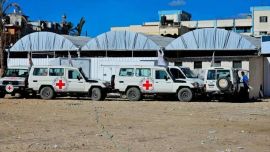Responding to an unfavourable Supreme Court ruling, Alberto Fernández said Friday he had finished drafting a new bill that would “empower” the Presidency and provincial governors to apply specific restrictions and measures within the framework of the coronavirus pandemic when circulation of the virus is high.
"I dedicated this morning to finishing the bill that I have promised to send [to Congress], so that we do not continue having the ups and downs to which the Justice system subjects us, with its peculiar way of seeing things, " said the Peronist leader, as he addressed a political event in Pilar via videoconference, explaining why he couldn’t be there in person.
The president was referring to Tuesday’s Supreme Court ruling that backed the Buenos Aires City government’s right to decide face-to-face classes continue at schools in the capital.
City Mayor Horacio Rodríguez Larreta has refused to heed a mid-April presidential decree that ordered the temporary closure of education institutions in a bid to lower the circulation of Covid-19. The opposition leader successfully challenged the measure in the high court.
In what some analysts see as an attempt to bypass the protections offered to City Hall by the Supreme Court’s decision, the government wants to send a bill to Congress outlining when and how specific Covid-19 sanitary measures are deployed.
It is not yet known what powers the bill will seek to strengthen and the government has given little away, though officials say the goal is to unify the criteria under which restrictions should be applied.
According to congressional sources, the text of the bill has been put together entirely by the government, with Legal & Technical Secretary Vilma Ibarra and Cabinet Chief Santiago Cafiero put in charge of drawing it up.
When sent to Congress, it is expected to jump the queue of bills awaiting debate, with the ruling Frente de Todos coalition considering the matter to be urgent.
"In the coming days I will send a bill to the National Congress so that, based on clear and precise scientific criteria, the President of the Nation and governors are empowered to take restrictions and care measures during this exceptional situation," said Fernández last week, when he first floated the idea.
Measures would be “based on epidemiological and sanitary criteria, considering first the number of cases in the population; next, the increase or not of cases in the last weeks; and finally, the level of occupancy of intensive care beds,” he added.
Sources in the Casa Rosada say that the government will seek opposition’s support, saying officials want to“generate political agreements and consensus.”
Health Minister Carla Vizzotti said last week that the idea was taken from a similar legislative push in Germany. Faced with an exponential increase in coronavirus infections in mid-April, lawmakers in the Bundestag approved a law unifying decision-making for the entire country.
The German law tightens pre-agreed health restrictions when the incidence rate (number of infections per week) of the virus exceeds 100 per 100,000 citizens for three consecutive days, for example.
Nevertheless, leaders from Argentina’s main opposition coalition, Juntos por el Cambio, have already expressed concern over the move, criticising the president’s move to acquire what they dubbed “superpowers.”
"A law cannot go against the Constitution, which is what establishes the level of responsibilities of each one of the governments," warned Rodríguez Larreta last week.
Fernández’s desire to send the bill to Congress as soon as possible comes as little surprise in the wake of Tuesday’s Supreme Court ruling, which delivered another political blow to a government which is openly seeking judicial reform.
In its published opinion, the nation’s highest tribunal ruled that the presidential decree suspending classroom education in the Buenos Aires Metropolitan Area (AMBA, in its Spanish acronym) had “violated the autonomy of the Autonomous City of Buenos Aires.”
The ruling was in response to litigation from City Hall against a presidential decree suspending classroom education for 15 days until the end of April, which was subsequently extended with another DNU.
The conclusion was reached by all four justices voting but expressed in three different opinions, with only Horacio Rosatti and Juan Carlos Maqueda coinciding. Chief Justice Carlos Rosenkrantz and his predecessor Ricardo Lorenzetti each issued an individual ruling. The other justice, Elena Highton de Nolasco had already ruled herself out, maintaining that this case did not fall under the Supreme Court’s jurisdiction.
Fernández strongly criticised the Court at a political event in Ensenada the following day, accusing the justices of "playing with the lives of Argentines."
"It is very sad to see the decrepitude of the law signed in a judicial ruling," he blasted.
Speaking after a government-branded video that hailed his administration’s funding of a housing scheme and criticising the Mauricio Macri administration for turning Argentina into a country of “misery and weakness,” the Peronist leader accused the justices of favouring the opposition.
"A judge can nominate a president and vote for him, but what he cannot do is favour the candidates they like with a ruling," he said.
"There is a valid DNU that nobody has questioned. Why did they comment on rules that were no longer in force? If you want to choose a candidate, go and vote, but do not use rulings."
Vice-President Cristina Fernández de Kirchner added her voice to the criticism, slamming the ruling as one of a number of judicial “coups against the democratic institutions elected by the popular vote.”
“Today, the Supreme Court has just decided, in the midst of a pandemic as decreed by the World Health Organisation, a health emergency sanctioned by Congress and with over 65,000 people dead in Argentina, that the government has no powers to take sanitary measures,” she wrote in a post on Twitter.
The ruling
The Supreme Court’s ruling favoured the City’s right to decide the continuation of schooling in the district’s classrooms and to regulate, in line with City Hall’s lawsuit. Tuesday’s ruling was extended to all provinces.
While adjudicating the already expired emergency decree covering the April 16-30 period, the 91-page ruling also applies to the ongoing emergency decree running for the next three weeks.
“The fact that strict observance of due procedure ran beyond the brief period of the impugned decree is no obstacle to this Court pronouncing, given that the circumstances under examination may be extended or repeated.”
All four justices also agreed: “The national state can only regulate the right to education concurrently with the provinces, establishing the bases but not substituting them nor deciding autonomously apart from the legal regime.”
Rosatti and Maqueda’s joint opinion said that it was up to the City to decide the forms of education of its inhabitants and that the national state had not grounded sufficiently that decisions governing sanitary aspects permitted it to legislate the modes of education of the City of Buenos Aires.
The justices stated that their decision is a criterion carrying the “maximum institutional relevance” in the framework of federalism and which must apply to future cases.
Rosatti and Maqueda said that the constitutional reform of 1994 gave Buenos Aires a new constitutional status as a “constitutionally federal city,” including its autonomy and its own prerogatives of legislation and jurisdiction. This new status prevents it receiving the same treatment as before the constitutional reform because it is no longer a “federal territory,” as in the times when the national authorities decided over the City.
Even if the City of Buenos Aires is the “Capital of the Republic,” the Constitution requires that it be primarily considered as a “constitutional city” and “only in a subsidiary form and exceptionally” as a territory governed by federal norms to the degree that those interests are compromised.
The justices further ruled that the formation of AMBA does not imply overlooking City autonomy.
“AMBA is not a ‘region’ in constitutional terms,” concluded the justices.
Chief Justice Rosenkrantz considered the article of emergency decree 235/2021 (already expired) suspending classroom education in the City of Buenos Aires to be “unconstitutional” with a particular vote highlighting that “emergency is not a licence to ignore existing law” and the municipal administration “has all the internal legislative prerogatives corresponding” to a province.
He warned, moreover, of the danger of “usurping” the functions of local authorities.
Rosenkrantz argued that the national government should attend to the problems provoked by the pandemic within the formal and substantial limits imposed by the Constitution, which also obliges the City authorities to ensure primary education while granting them attributes to promote education, science and culture. That is why, the chief justice declared, the national government can only decide over classes in the City where interjurisdictional or to promote the general national welfare as a whole.
According to Rosenkrantz, the case in question leaves clear that the interjurisdictional impact of classroom education invoked by the national government “is merely conjecture.”
The chief justice, who was appointed to the Supreme Court by presidential decree in 2016 before being later confirmed by the Senate, accepted as valid the evidence presented by the Horacio Rodríguez Larreta government showing low contagion within schools, the criteria of proximity whereby vacant spaces are assigned within the public system and the reduction in the use of public transport by pupils in comparison to the use prior to the pandemic.
He considered that the Alberto Fernández administration could not demonstrate a significant incidence of classroom education in the use of public transport in the district.
“The emergency is subject to the law of the land and is thus also a judicially regulated situation, which does not imply in any way that any measure which could be represented as effective in addressing that situation is constitutionally admissible only for that reason. We must not lose sight of the fact that an emergency does not create new powers once the existing powers can be restored,” wrote Rosenkrantz.
The 62-year-old also argued that the City of Buenos Aires conserves its “police powers” regarding public health and also over “how educational institutions function.” Here he maintained that “the national state cannot invoke interjurisdictional [powers] or affirm that the general welfare is at stake on a merely conjectural basis.”
In his arguments, the chief justice thus maintained that the emergency does not create new powers, writing that current law cannot be ignored.
Rosenkrantz also expounded on the arguments offered by both the national government and City Hall, defining that the former made a “global” reference regarding passenger transport. Along those lines he said that City Hall presented better arguments for classroom education.
Finally, the magistrate maintained: “The Constitution is our navigational chart and we must cling to it in times of calm and even more in stormy weather, not allowing ourselves to be carried away by the urge to decide at the margin of what it demands.”
The case
The case was initiated on April 16 by City Hall filing an injunction asking that the Supreme Court declare unconstitutional Article 2 of Decree 241/2021 issued by Alberto Fernández suspending classroom education in AMBA for two weeks.
Rodríguez Larreta’s administration affirmed that this article violated “the City’s autonomy, implying a virtual federal trusteeship because it arrogates prerogatives over such eminently local spheres as health and education.”
Three days later (April 19), the Supreme Court declared itself competent to rule in this case in line with the Attorney-General’s first opinion. In the second, presented last Monday, the Attorney-General’s Office affirmed that the decree was unconstitutional.
“The arguments in the impugned norm do not suffice to ground a state of necessity permitting the suspension of attendance at educational establishments at every level to be legitimised,” wrote Eduardo Casal, the under-interim attorney-general whom Kirchnerism seeks to remove.
Casal pointed out that the restrictions of classroom education “were not properly grounded since, without ignoring the epidemiological situation we are undergoing, they aim at restricting the fundamental right to education,” which it is City Hall’s duty to guarantee.
The opinions were not binding for the Supreme Court.
by James Grainger & Michael Soltys


























Comments